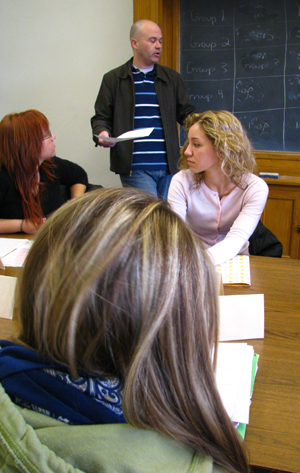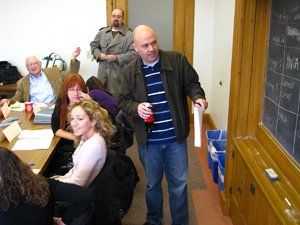Bulletin News

12/05/2011
Fifteen SUNY Cortland students gathered around a long table in an Old Main seminar room late last month to decide how to divide $10,000 in real money among 19 local non-profit organizations, most all of which made a strong case to receive a sizeable share.
Giving away money may seem like an easy thing to do, but doing it effectively can be very difficult, as many of the students in the Philanthropy and Civic Engagement: Teaching Students How to Give class quickly decided.
Faced with grant applications from so many charitable organizations — and rapidly running out of class time for the semester — five smaller panels of the students cautiously negotiated their final decision. They had finished analyzing the prospective grants. At this point, the classmates were guided only by their two professors, a blackboard featuring a grid of the five panels’ very different monetary choices, and each other.
As several students commiserated over whether to pare back one agency’s potential award to give another agency a grant amount closer to what had been requested, Christopher Latimer, associate professor of political science, weighed in.
“You have to stick to your guns if you feel you’re really right,” urged Latimer, who also serves as the College’s associate director of the Institute for Civic Engagement. Latimer has taught the class with Distinguished Service Professor Henry Steck.
“We didn’t know we couldn’t give more money than they requested,” explained one student involved in the decision-making. Because the students were discussing real organizations and distributing real money, the names of all students at the table are being withheld at the request of Latimer and Steck.
“If they’ve requested $900 and you grant them $1,000, you will have to know what that extra $100 is for,” Latimer replied.
Accountability is a key aspect of this particular class, in which the students make decisions with real impacts thanks to a grant aimed at developing future talent in the field of philanthropy. Last summer, Latimer and Steck were thrilled to learn that the Learning by Giving Foundation had awarded a $10,000 grant to SUNY Cortland so a class could learn about philanthropy by actually distributing the money to not-for-profit institutions that applied.
The Learning by Giving Foundation was recently spun off from the Sunshine Lady Foundation, which was founded by Doris Buffett, sister of the famous hedge fund manager and philanthropist Warren Buffett. The Learning by Giving Foundation seeks to advance the next generation's understanding of philanthropy by providing the financial, technological and intellectual tools to experience community impact and to make that knowledge widely accessible through an online forum.
The courses are intended to introduce as many students as possible to the power and potential of philanthropy and to encourage those who may not have explored this area in their undergraduate career. To date, only about 20 other colleges or universities have received a Learning-By-Giving grant. The course is sponsored locally by the Political Science Department and the Institute for Civic Engagement. The course designers hope to be able to offer the class again in the future.
 |
| Henry Steck, professor of political science, seated, and Christopher Latimer, associate professor of political science, team-taught a class in developing professional skills in the field of philanthropy. |
As the semester wound to its end, the students evaluated the proposals from the local non-profit agencies and charities. They devised their own fair and effective selection process to identify the most creative, efficient and beneficial community organizations to support. They determined how large a slice of the grant pie to serve each. From the start, they proceeded with their decision-making knowing they might give all the money to one organization or as many as 19 small grants to 19 entities.
The awards are to be announced during a special Learning by Giving ceremony, to which both the students as well as representatives of all the grant recipients are invited. The students will see their hard philanthropic work come to its fruition at 4:30 p.m. on Thursday, Dec. 8, in Brockway Hall Jacobus Lounge.
After the decision-making was over, senior business economics major Julie Gorman of Waverly, N.Y., described what she learned in the class.
“I thought, someday I want to know about giving money,” said Gorman, a non-traditional student who also is pursuing minors in law and justice and social philosophy. “Coming to class and learning all the things you do before doing something like that is really crazy, but cool. You feel like you’re kind of on the inside.
“It was quite difficult because we really all have these different interests,” Gorman said of the decision-making process. She was satisfied, for the most part, with the class’ final allocation of the grant money among seven applicants.
“I’m the kind of person who would rather give less to help out more causes, but I’m OK with it,” said Gorman. “My original thought was we would probably give out 10 smaller grants to 10 organizations to make it easier for us, but what I realized was that would actually make it harder for us. We thought, ‘What if we don’t give an organization enough money for their project? Will they not have enough money to do it, then?’ We realized, ‘It’s a tough economy and maybe they won’t be able to fundraise the remaining money.'”
Gorman is considering graduate school programs in law and higher education administration.
“I’m interested in student affairs and in that field you are always looking for money,” she said.
In other countries, such as in eastern Europe, the citizens look to their government rather than private charities for assistance, according to two other students in the class, Andreea Denisa Radu and Elena Ceban. Both are visiting scholars from Babes-Bolyai University in Cluj, Romania. They were recruited to study public administration and public policy at the College as Atlantis Scholars supported by the U.S. Department of Education and the Fund for the Improvement of Postsecondary Education (FIPSE).
“I think the idea of philanthropy in Romania is quite different than in America, really different,” said Radu, from Slobozia, Romania. “People don’t know they can form an organization and apply for a grant from another organization, a funding organization. I think people are not informed enough about this.”
For example, a major celebrity or sports figure might give money to a cause, Radu explained. But the gift is given directly; there’s no solicitation from many organizations to determine the most worthy use of the funding.
“I didn’t even know what philanthropy was, whereas it’s part of the culture in America,” added Ceban, a dual citizen of Romania and Moldova.
In this particular class, their presence has served to broaden the worldview of all the students.
 |
| Christopher Latimer, associate professor of political science, facilitated the class about the decision making process in grant awards selection. |
“This is what I like about the American culture, you might give money to a cause you haven’t even heard about before,” Ceban added. “I think American students are a lot more informed about philanthropy than in Romania. It might be they get this information from their parents. I’ve noticed in America that students get involved from their first semester in college. I think it’s a culture of always being involved, always being involved in a group, doing something for others for your own pleasure.”
Before taking the class, Radu thought that philanthropy was simply about rich people giving money.
“Now I can tell the difference between a charity and a philanthropy,” Radu said. “A philanthropic cause solves problems in society and a charity gives money away to a specific cause like to help persons who have a disability.”
“You read the proposals and you realize that it’s real people who wrote them,” Ceban said of the class. “I spent about eight hours of reading them and deciding ‘why this one’ and ‘why not the other one’ and discussing it with my panel.”
“This class helps me decide how to do things in my life,” Radu said. “It’s a complaint that students have about universities, that they learn stuff in the class they can’t use in life. But after this class, I’ll go home and I won’t look at causes that I used to give to in the same way. This is what makes me feel better. I know more things. I can get more involved.”
For more information, contact Latimer at (607) 753-4802 or Steck at (607) 753-4807.

